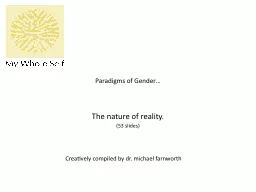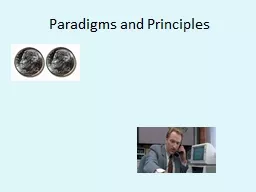PPT-Changing Education Paradigms
Author : lindy-dunigan | Published Date : 2016-08-04
Ken Robinson Education as Institution Education as Institution Roles of our Education system Two primary roles Socialization S ocial reproduction Education as Institution
Presentation Embed Code
Download Presentation
Download Presentation The PPT/PDF document "Changing Education Paradigms" is the property of its rightful owner. Permission is granted to download and print the materials on this website for personal, non-commercial use only, and to display it on your personal computer provided you do not modify the materials and that you retain all copyright notices contained in the materials. By downloading content from our website, you accept the terms of this agreement.
Changing Education Paradigms: Transcript
Download Rules Of Document
"Changing Education Paradigms"The content belongs to its owner. You may download and print it for personal use, without modification, and keep all copyright notices. By downloading, you agree to these terms.
Related Documents














